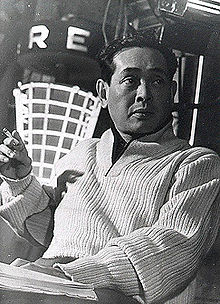
Back كيسوكي كينوشيتا Arabic كيسوكى كينوشيتا ARZ Keisuke Kinoshita Catalan Keisuke Kinoshita German Keisuke Kinoshita Spanish کیسوکه کینوشیتا Persian Keisuke Kinoshita Finnish Keisuke Kinoshita French Keisuke Kinoshita ID Keisuke Kinoshita Italian
Keisuke Kinoshita | |
|---|---|
 Keisuke Kinoshita (early 1950s) | |
| Born | Masakichi Kinoshita[1] December 5, 1912 |
| Died | December 30, 1998 (aged 86) Tokyo, Japan |
| Nationality | Japanese |
| Occupations | |
| Years active | 1933–1944, 1946–1988 |
| Notable work |
|
| Relatives |
|
Keisuke Kinoshita (木下 惠介, Kinoshita Keisuke, December 5, 1912 – December 30, 1998) was a Japanese film director and screenwriter.[2] While lesser-known internationally than contemporaries such as Akira Kurosawa, Kenji Mizoguchi and Yasujirō Ozu, he was a household figure in his home country, beloved by both critics and audiences from the 1940s to the 1960s. Among his best known films are Carmen Comes Home (1951), A Japanese Tragedy (1953), The Garden of Women (1954), Twenty-Four Eyes (1954), She Was Like a Wild Chrysanthemum (1955) and The Ballad of Narayama (1958).
- ^ Cite error: The named reference
hamamatsucitywas invoked but never defined (see the help page). - ^ Ronald Bergan "A satirical eye on Japan: Keisuke Kinoshita", The Guardian, 5 January 1999.